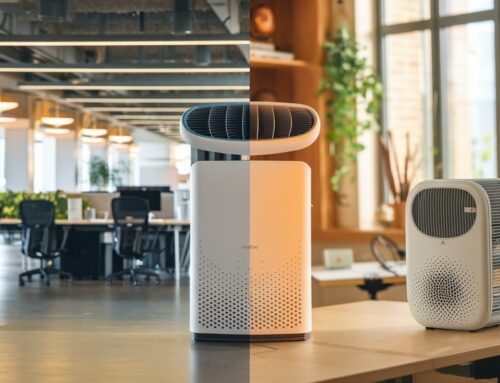October 16, 2024
Indoor Air Quality and Employee Performance Boost

Did you know that poor indoor air quality can reduce employee performance by up to 10%? Breathing clean air isn’t just about comfort; it impacts how well we work. Many offices overlook the importance of fresh air, affecting productivity and health. Better air means sharper focus, fewer sick days, and happier teams. Companies investing in residential air quality testing see a boost in overall performance. Simple changes can make a big difference. Let’s explore how improving indoor air can enhance your workplace and drive success.
Understanding Indoor Air Quality

Definition of IAQ
Indoor air quality (IAQ) refers to the quality of air within buildings. It is crucial for health and comfort. Poor IAQ can lead to health problems. It affects productivity, especially in workplaces. People spend a lot of time indoors, so maintaining good IAQ is important.
Common Indoor Pollutants
Indoor pollutants include dust, mold, and volatile organic compounds (VOCs). Dust can cause allergies. Mold testing is essential in damp areas to prevent respiratory issues. VOCs come from paints and cleaning products. These pollutants can harm health if not controlled.
Ventilation Systems’ Role
Ventilation systems help maintain optimal air quality. They bring in fresh air from outside, reducing indoor air pollution by diluting pollutants. Commercial air quality testing can ensure systems work efficiently in business environments. Regular checks are needed to keep them effective.
Impact on Employee Productivity

Cognitive Function
Clean air is vital for cognitive performance. Employees work better in environments with good air quality. Fresh air improves concentration and memory. This leads to enhanced problem-solving skills. A healthy office helps employees think clearly.
Increased Work Performance
Studies show a strong link between indoor air quality (IAQ) and increased productivity. Research by Harvard University in 2015 found that better IAQ boosts workplace efficiency by 61%. Employees perform tasks faster and make fewer mistakes. Regularly conducting air quality tests near you ensures your workspace remains efficient and productive.
Reduced Absenteeism
Air quality affects employee health significantly. Poor IAQ can cause ailments like headaches and fatigue. These issues lead to absenteeism and reduced productivity. Improving air quality reduces the risk of occupational diseases. This means fewer sick days and more consistent work attendance. Healthy employees contribute to better office work performance.
Effects of Poor Air Quality

Health Issues
Poor air quality can cause many health problems. Headaches are common when the air is polluted. Bad air conditions often lead to respiratory issues. People might cough or have trouble breathing. Pollutants like dust and mold can irritate the lungs. Long-term exposure increases the risk of asthma and other lung diseases.
Decreased Concentration
Polluted air affects how well employees focus. Poor IAQ often leads to decreased concentration. Workers might feel tired or sleepy. This fatigue makes it hard to stay alert. When people breathe in harmful air duct pollutants, their brain function can slow down. This affects their ability to think clearly.
Long-term Health Risks
Continuous exposure to air pollutants poses serious risks. Over time, poor ventilation can lead to chronic health conditions. These include heart disease and lung cancer. Biological air pollution can also weaken the immune system. Employees exposed to particulate pollutants may face long-term illnesses.
Role in Workplace Safety

Importance of IAQ
Indoor air quality (IAQ) is crucial for workplace safety. Poor IAQ can lead to serious health issues. Employees might experience headaches, dizziness, or fatigue. These symptoms increase the risk of workplace accidents. A safe environment needs good air quality.
Impaired Decision-Making
Bad air quality affects decision-making skills. It slows down reaction times and impairs cognitive function. Employees may struggle with tasks that require quick thinking. This can lead to mistakes and accidents. Ensuring clean air helps maintain sharp minds at work.
Regulatory Standards
There are standards for IAQ in workplaces. These standards help keep the building environment safe. They include guidelines on ventilation and pollutant levels. Employers must follow these rules to protect workers from hazards. Proper IAQ management helps prevent sick building syndrome (SBS).
Closing Thoughts
Indoor air quality is more than just a breath of fresh air. It’s a game-changer for your team’s productivity and safety. Poor air can sap energy and focus, leading to a sluggish work environment. But with clean air, you boost morale and efficiency. Your workplace becomes a hub of creativity and innovation.
Don’t let bad air hold you back. Take action now! Invest in better ventilation and air purifiers. Monitor air quality regularly. By prioritizing the air your team breathes, you pave the way for a healthier, happier workspace. Your employees deserve it, and so does your business success. Let’s breathe easy together!
Frequently Asked Questions
What is indoor air quality?
Indoor air quality (IAQ) refers to the condition of the air inside buildings. It affects health and comfort. Good IAQ ensures a healthier environment for employees, reducing sickness and boosting productivity.
How does indoor air quality impact employee performance?
Good IAQ enhances concentration and reduces fatigue. Employees perform better in environments with clean air, leading to increased productivity and efficiency.
What are the effects of poor indoor air quality on health?
Poor IAQ can cause headaches, allergies, and respiratory issues. It may lead to long-term health problems, increasing absenteeism and affecting employee well-being.
How can businesses improve indoor air quality?
Businesses can enhance IAQ by improving ventilation, using air purifiers, and maintaining HVAC systems. Regularly checking for pollutants also helps maintain a safe work environment.
Why is indoor air quality important for workplace safety?
Good IAQ prevents exposure to harmful pollutants and allergens. It ensures employees work in a safe environment, reducing the risk of health-related incidents at work.
Can poor indoor air quality affect mental health?
Yes, poor IAQ can lead to stress and anxiety. Clean air supports better mental clarity and emotional well-being, contributing to a positive workplace atmosphere.
What role does ventilation play in indoor air quality?
Ventilation is crucial for removing stale air and bringing in fresh outdoor air. Proper ventilation systems help maintain optimal IAQ by controlling humidity and reducing pollutant levels.









